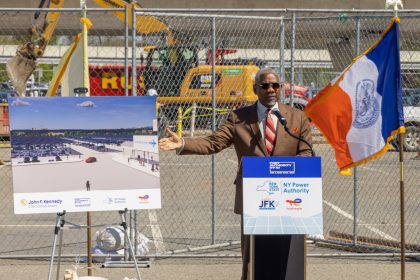To Pay for Green Infrastructure, Cities are Turning Stormwater Into an Economic Resource
But clever new financing instruments come with their own risks

This article is by Sarah DeWeerdt and was originally published by Anthropocene magazine.
Stormwater is a big problem for cities—and a growing one. Lots of urban surface area is impermeable, so stormwater can’t sink into the ground but instead flows through the city. Meanwhile, climate change is altering and often intensifying rainfall and precipitation patterns.
Enter green infrastructure: natural areas that can capture, store, and filter stormwater, provide habitat and other benefits, and help cities comply with water quality laws and regulations.
City managers want to expand green infrastructure, a new study shows. The problem is that green infrastructure is expensive and many cities are strapped for cash, leading them to experiment with new financing mechanisms that come with additional risks.
Researchers gathered online survey responses from people responsible for stormwater management in 233 municipalities across the country. The survey covered financing mechanisms for stormwater management as well as climate change adaptation planning and how it relates to stormwater management.
“Only 168 of the surveyed municipalities indicated that they have a stormwater management plan and only 32 stated that they have a climate change adaptation plan,” the researchers report in the Journal of Environmental Policy and Planning.
Municipalities in Democratic congressional districts were more likely to have climate change adaptation plans, they found. Municipalities that frame stormwater management in terms of ecosystem services are also more likely to have climate change policies.
Stormwater projects are often reactive, the survey respondents said—for example, cities repair or beef up flood control infrastructure after a hurricane or storm moves through, rather than looking ahead to prevent floods in the future. And municipal climate change planning is more likely to focus on carbon footprints than stormwater flows.
A lot of municipalities use stormwater utility fees—a dedicated fee usually based on the average impervious area of a residential property in the area—to fund stormwater infrastructure. Yet, even though changing stormwater flows are a likely impact of climate change, 71% of survey respondents said their municipality does not use stormwater fees to fund climate change adaptation projects.
Moreover, stormwater utility fees are rarely sufficient to fund all the projects needed for stormwater management. Many survey respondents said they wanted to expand green infrastructure in their city, but said that limited budgets often have to be directed towards maintenance or repair of old “gray” infrastructure (such as sewer systems, concrete storage basins, and treatment plants) instead.
“The lack of financial resources and funding streams to implement green infrastructure and to update existing stormwater and flood control systems has driven municipalities to experiment with a range of financial tools,” the researchers write. In fact, municipalities with a climate change adaptation plan are more likely to be using these financial tools, they found.
These tools include municipal green bonds, tax increment financing (which leverages future tax revenues to encourage development in specific areas of the city), and mitigation banking (in which developers can buy and sell wetland restoration credits).
What all these mechanisms have in common is that they seek to turn stormwater and the ecosystem services provided by green infrastructure into economic resources. It’s a clever approach, but introduces new risks, the researchers argue.
Debt servicing on green bonds, for example, leaves municipalities less able to make other investments. And the benefits and costs of these mechanisms may not be distributed fairly—for example, a green infrastructure project may be located in a wealthy area of a city, but residents in disadvantaged areas may pay for it through utility fees. “With an estimated $298 billion in capital investments needed to improve the United States’ wastewater and stormwater infrastructure over the next 20 years, much is at stake in terms of how, for whom, and where these improvements will take place,” the researchers write.
Anthropocene magazine, published by Future Earth, gathers the worlds’ best minds to explore how we might create a Human Age that we actually want to live in.
Sarah DeWeerdt is a Seattle-based freelance science journalist specializing in biology, medicine, and the environment. In addition to Anthropocene, her work has appeared in Nature, Newsweek, Nautilus, Spectrum, and many other publications. Find her on Twitter at @DeWeerdt_Sarah.
Source: Cousins J.J. and D.T. Hill. “Green infrastructure, stormwater, and the financialization of municipal environmental governance.” Journal of Environmental Policy and Planning 2021.
























